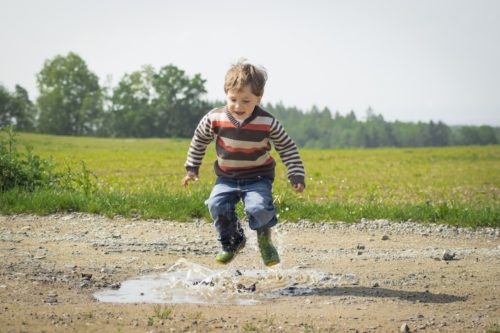 Photo Credit: Luna Lovegood
Photo Credit: Luna Lovegood “Work consists of whatever a body is obliged to do. Play consists of whatever a body is not obliged to do.” Mark Twain
Kids from decades ago would be astounded at the variety of toys, games, and sports that children today enjoy. Those children from the 1970s and before were likely told on a summer’s morn, “Now, don’t come back until lunch.” In the evenings, kids knew to come home when the streetlights lit up.
What did they do with all that free-play time? They played knights and dragons, or fairies and goblins. They built tree houses. They studied toads. In other words, they did whatever took their fancy that day, and their fun was rarely overseen or directed by grown ups.
Nowadays, play culture has changed. Kids don’t get together ad hoc around the neighborhood. They have scheduled play dates instead. Play involves more toys and equipment than imaginations run riot. We want our kids to be safe, protected, cared for, educated. Parents and teachers plan, purchase, and instruct. Kids have turned into the recipients of planned play, not the inventors and rulemakers of their imaginary worlds.
“We’ve complicated something so essentially innocent and straightforward—kids just need a safe setting where they can become strong and resilient and develop into thinkers, builders, creators, and explorers.” Joe Frost (Professor Emeritus at the University of Texas, and one of America’s leading experts on play and playgrounds)
Many child development experts are concerned about this lack of time and space for free-play. According to the American Journal of Play, children today are playing less and hurting more. The common deficiency of independent play is correlated with a rise in mental health problems. (Source)
These include:
- Anxiety
- Depression
- Helplessness
- Suicide and suicidal ideation
“The greatest gifts you can give your children are the roots of responsibility and the wings of independence.” Denis Waitley (Author and Motivational Speaker)
So, what are the advantages of more independent and self-actualizing free time for childhood play? The benefits are many and are building blocks of healthy maturity.

Discovering Interests, Vocations, and Passions
If constantly directed to interests by adults, children may miss the opportunity to figure out how they fit into life. Exploration that is open-ended and non-directed leads kids into twists, turns, and surprises.
While parents and educators may highly value STEM education, it is possible that, by over-emphasizing the field, a child might miss the talent he has for painting.
Over-scheduling and authoritarian direction keep children busy, but busyness is the enemy of boredom. Boredom is the incentive to use imagination and can be a valuable tool for discovery. (Source)
Building Self-Esteem and Self-Confidence
A child’s concept of self develops with success and failure. Failure isn’t necessarily negative. It is essential to growth. Kids quickly learn that they cannot just try once or twice with little effort and succeed. Eventually, they find that to achieve a valuable goal; they must put forth great effort and sometimes many efforts. This lesson must develop intrinsically as a result of many lessons over the entire scope of childhood. The tutelage is self-directed, self-enforcing, and, most of all, fun. (Source)
Learning Social Resilience
One of the most difficult interpersonal skills to master is resilience. When young children begin preschool or daycare, arguments and fights are common. Two toddlers want the same toy. The more outgoing child may take the toy by force. The more laid-back child may give it up without a struggle. Neither of these reactions is ideal. As kids grow and interact more, they learn how to settle disputes more fairly and peaceably. Non-directed interpersonal play may present more of these opportunities for clashes. Again, this is not a negative. The more children have a chance to work out disagreements, the more skilled they will become at learning important social skills that will serve them for life. (Source)
Discovering Adulthood
Children have a natural affinity for playing grown-up. Some children stick with their dreams of becoming a fireperson, astronaut, or doctor for years. Others try and discard possible identities within hours. The goal is not to find a career path. The prize is discovering how many ways there are to live within the world. If given opportunity and space, a child can imagine dozens of possible careers. A group of children deciding together to play grocery store, bus driver and passengers, newspaper publishers, or school will work better than any directed play could. When freed, young imaginations soar far beyond the adults around them. (Source)
Learning to Succeed
When a child imagines, arranges, and plays, they eventually learn to be successful. Each step forward builds on the last. Month by month, year by year, children learn more, attempt more, succeed more. Childhood lasts about two decades. It takes every one of those valuable years to achieve a state of mind that enables successful adulthood. The role of the adults in a child’s life is not just to protect; it is to prepare them to be a valuable and happy contributor to society. Freedom cannot begin in the freshman year of college. Even adults can garner real benefit from more play. (Source)
Some parents will always be more involved in planning and directing child play, but it is essential for all of us adults to recognize and value the contribution of free-play for children. It may be a simple matter of giving a different answer when our kids say they’re bored. Instead of directing them to possible activities, we can just ask, “What do you think?” When given the challenge, they will eventually learn to answer that question themselves with fascinating results.
For an even deeper dive into the benefits of free play, along with ways to encourage it, please check out our other article here: https://wetheparents.org/importance-of-free-play.
About this Contributor:  Neve Spicer is a writer at WeTheParents.org, a teacher, and the mother of three children. She seeks simplicity and humour in parenting, and passionately advocates for more (not less!) play time. She is based in the United Kingdom (UK).
Neve Spicer is a writer at WeTheParents.org, a teacher, and the mother of three children. She seeks simplicity and humour in parenting, and passionately advocates for more (not less!) play time. She is based in the United Kingdom (UK).
Disclaimer: the content provided here and throughout HealthyPsych.com is for informational purposes only and is not intended as medical advice. Please consult directly with your medical provider on your specific needs. Our full disclaimer and terms of use can be found here: Terms of Use.

Leave a reply
You must be logged in to post a comment.